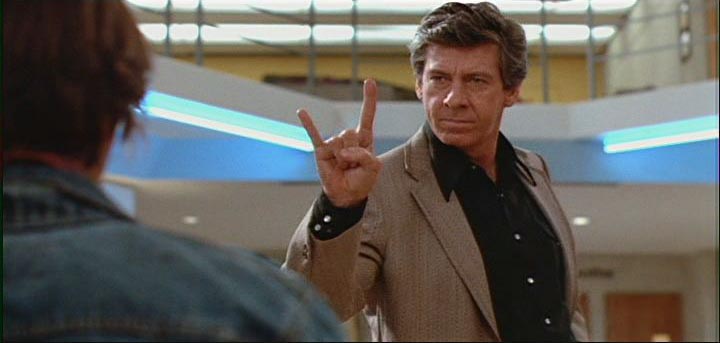Danger: Violence!
No time to mind the p’s and q’s with this music video, this week’s readings touch a nerve with a topic supposedly inappropriate for most students, yet as Bourdieu would point out, all within the “field” of child development: violence. It is as unavoidable as Bourdieu, Foucault and Marsh make it out to be in their writing. Evidence can be found in the earliest form of children’s literacy: my wife, an Early Child Care Educator, began a project with the 3-to-5 year old children at her centre. They would create a story, each taking turns with a sentence. From the outset, the children decided that they wanted to tell a happy story, and selected an animal living in the woods, going for a walk. It did not take too long to establish the field, and as soon as the animal came to some water, it fell in and was eaten by a shark. When my wife asked what happened to the happy story, the children had unanimously decided that this turn of events is the only one that could take place; the doxa determines that stories must end tragically, despite many examples in the centre of happy endings. On a similar train of thought, high school students that I tutor are often given open-ended drama activities where they get to create a new final chapter for Lord of the Flies or a different fifth act of A Midsummer Night’s Dream, and it seems like the only ending is one where the characters find a way to kill each other off. This is not to say that every single child is innately violent, especially those digital natives who are more familiar with video games and popular culture than paper-bound books. Perhaps there is something wrong with the schooling, the forcing of creative choices on students who just want to end the story in the quickest and most final way possible: the protagonist dies, the end!
Foucault speaks about this tendency toward violence in his abridged chapter “the Discourse of Language” and words like “prohibition”, “control” and “discipline” are used with increasing frequency. One can only imagine what words were used in the omitted passages (everywhere there was a “[…]” indicated parts of the lecture we are not privileged enough to hear). There are words one must not say, like yelling fire in a crowded theatre, and as much freedom as we are supposed to share in democratic societies, there is the implicit understanding of what sane people say and do. What mad people say can be ignored, what they do can be controlled through institutions like hospitals or prisons. “Every educational system is a political means of maintaining or of modifying the appropriation of discourse,” (Foucault, 1970, p. 239) and as teachers, it is really up to us to monitor what is happening for the future citizens. My wife, on the other hand, argues that children as young as the ones at her infant-toddler centre are already citizens, and the process of schooling withholds democratic participation, for their own benefit of course. Even for the student teacher Jackie Marsh interviews, there is a sense that the participants are being held back, their version of popular culture in their practica was rife with misunderstanding and possible falsehoods in reporting. As much control is needed at this end of the education system as it does at the beginning. While Marsh centres upon the limited field of experience of students’ popular culture for one or two of the participants, using Bourdieu’s theory as her frame, the suggested better way is to let students decide for themselves what is the best way to interact with literacy. Letting go of tried-and-true standards, like Golding and Shakespeare, may be the only way forward, as long as students are aware that some people at some point in history thought these authors were as exciting as Pokëmon or Minecraft.
Lastly, Bourdieu (1982), in his own words, sees that intimidation “can only be exerted on a person predisposed (in his habitus) to feel it” (p. 471) which sounds like a tough-love approach to moderating the psychological scars we inflict upon each other with our choices of words. Blaming the victim, or just simply pointing out that some people have the ability, thanks to various forms of capital, to absorb or ignore? As the majority of scholars seem to be increasingly French, I am reminded of a silly yet politically-charged moment in cultural history, not too long ago, when “freedom fries” were items to be found on American menus. Despite centuries of ideological sharing between France and the United States (the Statue of Liberty being an iconic symbol of the pact between the two nations), one political act of violence turned brother against frère. What would Bourdieu made of this Jimmy Fallon and Tina Fey’s Weekend Update?
Reference
Bourdieu, J. (1982). “The production and reproduction of legitimate language”. In Routledge Reader (reference needed). 467-477.

One Comment
For all the random thoughts running through my head while reading this week, none of them seemed to help me during class discussion. As Theresa point out, I was a bit quiet the other day. While I look forward to participating more with classmates presentation and small-group discussion, at least there is an absence of violence in not speaking (or can it be construed as being too aloof and excluding?). I look forward to adding another French theorist to the roster as I prepare to write a book review on Deleuzean literacy.